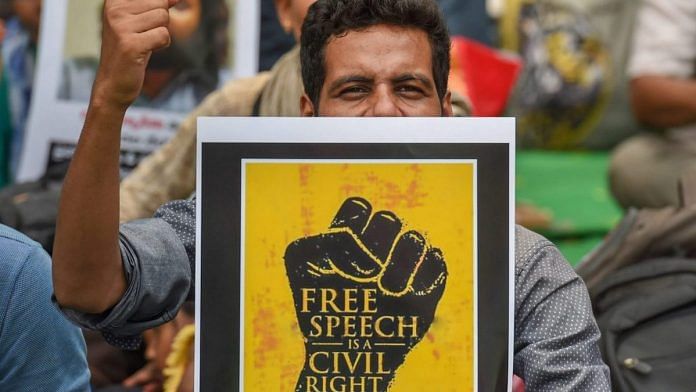But it is elementary that freedom of expression (including academic freedom) is not to be restricted to views of which one approves, and that it is precisely in the case of views that are almost universally despised and condemned that this right must be most vigorously defended.
This is a frequently cited excerpt from American philosopher and political scientist Noam Chomsky’s response to the “Faurisson affair”, the French academic who published a book denying the existence of gas chambers in Germany. Chomsky’s defence of Faurisson’s right to publish his work generated outrage in the French media, and the former’s abstract defence of free speech was often interpreted as covert anti-semitism or indirect support for Faurisson’s views.
Since, in 2020, the world has become deeply polarised, the issue of free speech and intellectual tolerance is a crucial test of our own ability to live up to the principles we apply to our ideological opponents.
I argue that social media platforms should be subjected to minimal regulation, both by the state and by their own internal regulatory measures.
India is infamous for drawing connections between speech and action
As we move towards a more globalised world, there should be an alternative public sphere, which is not governed by national interests. Furthermore, in liberal democracies, standards of offensive speech go through dramatic changes with changing governmental regimes and dominant ideological formations. Even with a liberal Constitution, expecting the state to ban speech on social media sets a dangerous precedent.
The move towards decreasing state intervention was partially achieved in 2015 when Justice Nariman struck down Section 66(A) of the Information Technology Act, which criminalised “grossly offensive”, “menacing” or “annoying and inconvenient” speech over the internet. This judgment significantly narrowed the definitions of the conditions that can curtail free speech. For example, he pointed out that terms such as “tendency” can be dangerous for defining the conditions for regulation.
India has an infamous history of criminalising free speech by drawing loose and vague connections between speech and action.
For instance, the judgment that denied bail to activist Safoora Zargar, who was arrested for allegedly inciting the February riots in Delhi, was severely criticised by the legal community because it interpreted her mere presence and speech near a site of violence as an incitement to violence.
Minimal state regulation can prevent this climate of chilling effect created by the state and ensure the articulation of impermissible opinions.
Regulations can also be biased
Another argument for limiting expression of certain opinions is that the rate at which it disseminates information is fundamentally different from other media platforms. But if we begin to regulate certain kinds of speech simply because it will spread faster through social media than otherwise, then social media platforms can be infinitely manipulated to regulate any speech, regardless of its content, which has the potential to spread rapidly and create impact.
Delegitimising opinions by removing them from one or more platform is not only ineffective in addressing the harmful attitudes at stake here, but it further imparts the glory of rebellion to those opinions. It expands the market for those opinions by giving it visibility because everybody likes the lure of the forbidden. An article in The New York Times says that during the US elections, a large number of ultra-conservatives and Trump supporters switched to different social media platforms, like Parler, after being banned from Facebook and Twitter.
Social media platforms are driven by market forces and their internal regulatory mechanisms are not immune to insidious political influences. Minimal regulation can prevent potentially excessive or biased regulation.
The principles of minimal regulation should be governed by tightening the test for inciteful speech, heightened context-sensitivity when offensive slurs are used, and sensitivity to different modes of speech like satire, irony, sarcasm, funding research to develop finer fact-checking mechanisms for viral content and news items. Obvious crimes like incitement, historically abusive slurs, intimidation, blackmail, sexual harassment on social media can be targeted with existing legislation for similar crimes in non-virtual spaces.
Need for design ethics
Instead of focusing on regulating speech, there should be lobbying to fund research into design ethics. In an article on Medium, former Silicon Valley employee Tristan Harris details the ways in which social media manipulates every single choice we make when we decide to use the platform. Highly sophisticated algorithms are built to tap into patterns of human emotions and desire.
Since 2013, the Centre for Humane Technology has been campaigning to re-design technology to serve the interests of people. This kind of research has the potential to offer concrete solution to how visibility patterns of viral posts can be controlled, counter-opinions can become more visible and available, and whether impulses such as ‘liking’ or ‘mass sharing’ a post should be re-thought and substituted with responses which cater less to the desire for instantaneous validation/recognition.
A shift of focus on changing user and consumption patterns by altering the structure of these platforms can usher changes that rise above the concern around disciplining and punishing speech.
Amreeta Das is a student of Jadavpur University, Kolkata



